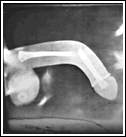|
The last time you were hot in bed
was when there was a heat wave. And the only thing
that gets turned on once the lights go out is the
alarm clock buzzer. Maybe your spouse pesters you to
do the mattress dance more than you want to. You may
even oblige, but you don't really want to and don't
really enjoy it. Is there something wrong with you?
Sex therapists don't like to play a numbers game when
talking about frequency of intercourse and what's
considered normal. They're more concerned with
determining what's right for a couple to maintain a
healthy relationship.
"If you're in a
relationship and you make love one or two times a
month or less, that might be considered low," says
Shirley Zussman, Ed.D, a certified sex and marital
therapist in New York City and director of the
Association for male sexual dysfunction. "But who's
to say what level of desire is more desirable?" Low
libido becomes a problem that should be addressed only
when it is perceived as problem, sex therapists
say. "It's usually only in the framework of a
relationship that it becomes an issue," Dr. Zussman
says. "It's when there is a discrepancy in desire
between the person and the partner, or when people
feel there's something wrong with them because they
have a low level of desire." Everyone experiences
peaks and troughs in sexual desire, an ebb and flow in
libido that could be caused by any number of factors,
from a bad childhood to a bad day to a bad illness,
from too much stress to too little time. Occasionally,
a hormonal imbalance or prescription drug will help to
sap your sex drive.
And, of course, there's a
difference between sexual drive and sexual function.
You may be able to become aroused and experience
orgasms yet have little or no interest in doing so.
(That's why seeking professional advice from your
doctor or a qualified sex therapist is not a bad idea
if your problem persists.) If your lowered libido
persists and you perceive that you have a problem,
what can you do about it?
Symptom
relief
Libido is an appetite, and it often can
be very difficult to help someone acquire the taste
for something - or to acknowledge to themselves that
they really do have a craving for something
delightful, says Dr. Zussman. "You can present
tempting foods like a luscious dessert," she says,
"but that won't necessarily help someone who doesn't
feel like eating or who denies the pleasure of eating
sweets." Here's what therapists might suggest to
cultivate a sexy sweet tooth and put a lilt in your
libido.
Sample from the sexual spice rack - For
many couples, sex becomes as exciting as doping the
dishes because they do the same thing all the time.
Reading a sexual manual and trying new positions or
new techniques may add a renewed dash of zest to
making love, Dr. Zussman says.
Don't forget to
touch - People with low libidos often are reluctant to
express any sort of affection towards their mates,
according to Jo Marie Kessler, registered nurse
practitioner, certified sex therapist and educator in
private practice in San Diego. They may believe their
gestures amount to teasing or will spark a debate over
making love, but the loss of touch makes their
partners feel unwanted and unloved. "I always
encourage them to maintain or resume expressions of
affection - a kiss on the cheek or lips, casual
touches on the arm or shoulder, a brush of their
hair," she says. "Both partners need to demonstrate
that they care, but with understanding that the
display of affection is not a signal for
sex."
Read something risqué - You don't have to
don sunglasses and a raincoat and creep into an adult
book shop, but you could read some romance novels,
love poems or erotic literature to try to nurture or
enhance your own sensuality.
Spend an hour in
the shower - Don't treat bath time as just a three
minute clean up before you dash out the door to work.
"Avail yourself of all the sensual experiences in the
shower or bath. Feel the pleasure of the water as it
dances on your skin. Lather yourself sensually,
perhaps with a loofah sponge rather than a flannel.
Use bath salts and slightly scented
candles.
Let your fingers do the talking - Take
the time and pleasure to know your own body and your
partners without any pressure to have intercourse and
orgasm, Kessler says. "Focus on the leisurely
exploration of each other's bodies, and share the joy
and intimacy of that alone." Touch each other, feel
and caress each other's genitals, notice the
sensations of your two bodies as they move about. Tell
each other what feels good.
Don't hesitate to
help yourself - Sexual self-gratification is not dirty
or wrong, Kessler says. In fact, a person with low
libido can use masturbation to learn what feels good
to his or her body, so that sex provides positive
feedback instead of negative feedback. Practice first
in private, she suggests, where you won't be self
conscious, then broach the topic of mutual
masturbation with your partner.
Mind over
sexual matters
In conjunction with sexual
enhancement techniques, sex therapists also suggest
other kinds of strategies to heighten a low libido.
"You can deal with the immediate problem of
techniques, but that might not help forever or to save
a relationship," Dr. Zussman says.
Here are
a few other approaches
Dig yourself out of the
dumps- Depression can produce some very physical
symptoms and is one of the most common causes of
inhibited sexual drive, Dr. Zussman says. "When you're
depressed, you have an interest in practically
nothing. Certainly your libido will be decreased too.
It just flies out the window."
Look in your
medicine chest - A number of prescription and over the
counter drugs, especially certain types of psychiatric
and antidepressant medications and some pills to lower
high blood pressure, could dampen libido for both men
and women, says Richard C. Reznichek, M.D., a
certified sex therapist, assistant clinical professor
of urology at UCLA and urologist in Torrance,
California. Some drugs also interfere with your
ability to be aroused. If your using medications that
you think are responsible for decreasing your sex
drive, stop taking them. Speak with your doctor and
ask for alternative drugs.
Ask for help - From
your spouse, that is. At least at first. He or she
may, after all, have been the first to note the low
libido. Whether it's exploring each other's
sensuality, experimenting with new positions or trying
to get in the mood more often, explain to your spouse
that you may feel awkward, self-conscious and a bit
stressed in attempting to change, but that you want to
do it for the sake of the relationship, Dr. Zussman
says. "Evoke their cooperation. Tell them that you
need their help and understanding."
Talk to
yourself…or perhaps a friend - Ask yourself why your
sex drive has taken a nosedive, Dr. Zussman says. Has
it always been that way? What was happening in your
life and relationship when it veered? Mull it over in
your head, and then talk to your partner, a friend or
a family member who knows you well, Dr. Zussman says.
They may help to spark some insight.
Take time
to address your stress - He works, she works, he's
tired at the end of the day. She comes home late
several evenings a week. The kids have homework that
needs to be checked. The ambition to excel
professionally, the demands of raising children, the
need to maintain social connections - all these
stresses put the brakes on the sex drive, Dr. Zussman
says. "That can out you in a state of apathy when it
comes to sex," she adds.
None of these every day,
every week worries leaves much time, ambition or
emotional energy for making love, Dr. Zussman says.
She suggests that a couple may need to give sex higher
priority in their relationship. "Try making a date
with your partner. Not just to make love, but talk to
each other, hold each other and share your feelings
and concerns about each other. That may help to
restore your sexual interest."
Help for
those hormones
It's also entirely possible that
your libido is being K.O.'d by a hormone imbalance in
the body. Here's what you should consider.
Deal
openly with the menopause - some women may notice a
declining interest in sex during menopause, Kessler
says. It's a common side effect while the body is
trying to adjust. Oestrogen replacement therapy can
help return your libido to normal, she
says.
"Once the
unpleasant symptoms of the menopause have stopped, the
drive returns and could even be enhanced."
If you are going through the
menopause, ask your doctor about hormone replacement
therapy.
Wait out the pregnant pause - Hormonal
changes during pregnancy, especially the last
trimester, and lactation often can dampen the drive
for sex, according to Kessler. "Hormones are present
in different levels at these times," she says. "Loss
of libido immediately after childbirth and during
lactation is natures way of spacing
children."
Test your testosterone levels - If
you're a man who seemingly has no psychological reason
for a lack of desire, you may want to ask your doctor
about having a blood test to measure your body's level
of testosterone. Low levels of the male hormone aren't
a common cause of sapping your sexuality, but it
always must be suspected, Dr. Reznichek says.
Depending on the cause, a doctor could prescribe
either testosterone injections or a medication that
counteracts other hormones that are suppressing
naturally occurring testosterone, he says.
... OR it
could be that...
Let me explain a little further for
those that may be confused... and please re-read this
and take the info in.
I have had a few letters
from people around the world making the point that my
Layman’s Guides stacks and cycles are a little TOO low
power. They mention that I have, shall we say,
‘underdone’ the amounts. Some of them make the point
that comparison cycles from the Net and elsewhere are
far more effective because the amounts that are given
in them are far more than those of mine.
The
cycles and stacks that I give are the safest that they
can be. The do not reflect on compared cycles from
others because I am not a twat! There is NO need to
take too much, why should there be? I have said this
many, many times; why take 10 when 1 may do the job?
DO NOT be fooled into thinking that more is always
better - I cannot stress this enough.
I am not
writing this for the fun of it. I am genuinely
concerned that some of you will and HAVE gone far too
much over and above what was needed. Fuck the dealer
and his comments of “double the dosage and double the
muscle” - they cannot be more wrong I assure you and
some do this be assured.
The libido article makes some good
points and in most cases gear problems are not always
the cause, but if you do experience problems in your
nut bullet area, then take the pointers given in the
article seriously, but a look at the amounts and types
of gear that you are using. You could have the answer
right in front of you. Think about
it. |


